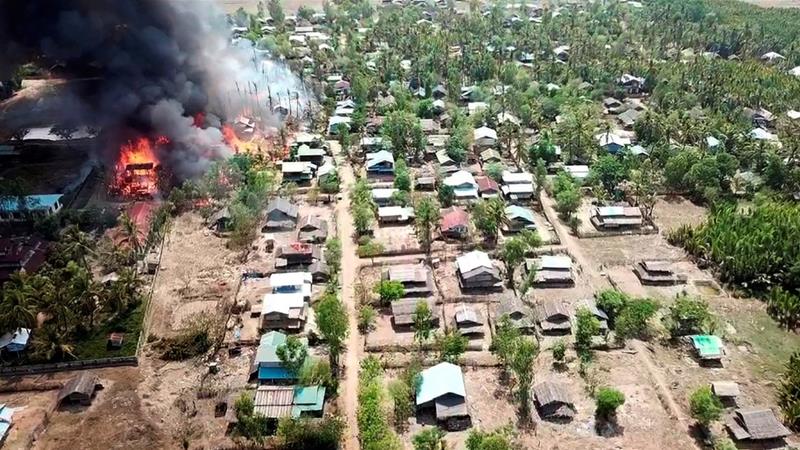Myanmar’s military has killed civilians, including children, in indiscriminate air attacks amid worsening conflict in the country’s western Rakhine and Chin states, a prominent rights group has said, urging the United Nations Security Council to launch a war crimes investigation.
In a report on Wednesday, Amnesty International said it collected new evidence showing Myanmar’s military – also known as the Tatmadaw – bombed several villages in Chin state in March and April, killing more than a dozen people.
One witness who was interviewed remotely told the group that an air raid in Paletwa Township on March 14 and 15 killed his uncle, his brother and his brother’s 16-year-old friend.
Two people from another family in the same village cluster said nine people, including a seven-year-old boy, were also killed in the bombardment.
“Our family is destroyed,” the boy’s father told Amnesty.
The conflict escalated in January last year following an AA attack on police posts and worsened in March after Myanmar’s government officially labelled the group a terrorist organisation. The AA posed “a danger to law and order, peace and stability of the country and public peace,” it said.
Call for international investigation
Tens of thousands of people have been forced from their homes in the unrest, and much of the fighting is taking place in communities where the internet has been cut off for more than a year, and against the backdrop of the new coronavirus pandemic.
“While Myanmar authorities were urging people to stay at home to help stop COVID-19, in Rakhine and Chin states its military was burning down homes and killing civilians in indiscriminate attacks that amount to war crimes,” said Nicholas Bequelin, Amnesty International’s Asia-Pacific Regional Director.
He called on the UN Security Council to refer the situation in Myanmar to the International Criminal Court (ICC) for prosecution.
“The reliance on air strikes and internet blackouts may be new, but one constant is the military’s remorseless neglect for civilian life,” Bequelin said, adding: “This relentless pattern of violations is clearly a matter for the ICC. The Security Council must act.”
Media access to Rakhine is heavily restricted, and prearranged visits with government minders are the only way foreign journalists can report from the area.
Myanmar is already under investigation in the International Court of Justice (ICJ) over its treatment of the Rohingya, hundreds of thousands of whom fled Rakhine following a brutal military crackdown nearly three years ago. The government had defended what happened then as a legitimate response to attacks by Rohingya fighters from a small armed group, known as the Arakan Rohingya Salvation Army.
In January, the court said “irreparable damage” had been caused to the Rohingya and ordered the government to take immediate steps to prevent genocide. Some Rohingya still live in the area, often in squalid camps.
In its latest report into the situation in the troubled region, Amnesty said it collected testimony from witnesses who recounted arbitrary detention and torture, and verified video footage showing abuses by the Tatmadaw. One woman whose husband was arrested in February said soldiers had tied up the detained man and beaten him for four nights and five days.
“He wasn’t given food or water … They kicked and hit him with rifles in the back and kicked his chest as well,” she said, recounting what her husband had told her. “Before this, he was tall and big, but when I saw him … he was visibly thin.”
Beatings, threats
The group, citing satellite imagery of conflict-affected villages, also reported widescale burning consistent with Myanmar military tactics. The Tatmadaw and the Arakan Army have previously blamed each other for the village burning.
Separately, the Chin Human Rights Organization (CHRO) said more than 500 Chin people were currently stranded in Paletwa after the army turned them back as they were returning to their villages by boat. The group – all local administrators – had travelled to the town for a meeting.
The military “stopped us and told us that we cannot go back to our villages,” one of the village administrators told CHRO. “When we asked them why we are not allowed to return having already allowed us to enter, the soldiers at the security post shouted, ‘Do not ask any questions or say anything in return. We were given orders from above.’ No one dares to go since some boats were even shot at in order to threaten us.”
Amnesty said it was not able to document operations and abuses by the Arakan Army in the reporting period due to COVID-19 travel restrictions and limited access to conflict-affected areas and witnesses.
But reports suggest the Arakan Army has continued a pattern of abuses including the endangering the lives of civilians during attacks and intimidation of local communities, the group added.
Source: Al Jazeera






 WhatsApp us
WhatsApp us 

